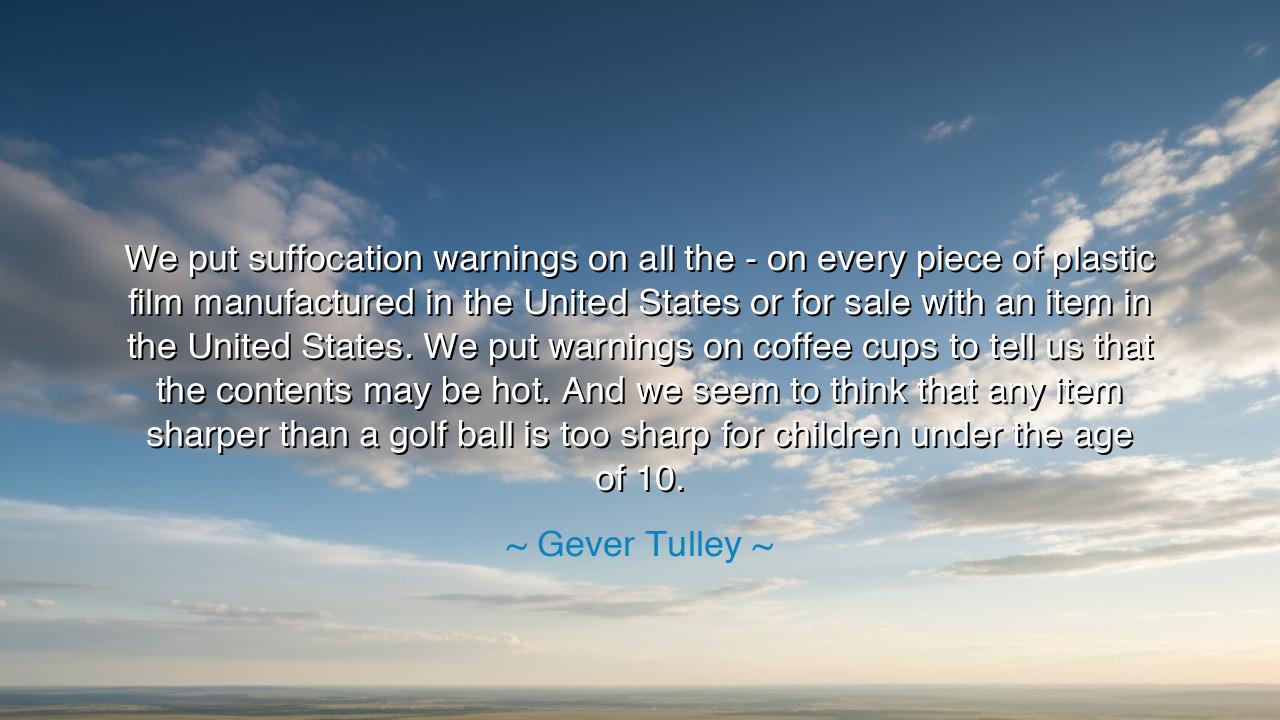
We put suffocation warnings on all the - on every piece of
We put suffocation warnings on all the - on every piece of plastic film manufactured in the United States or for sale with an item in the United States. We put warnings on coffee cups to tell us that the contents may be hot. And we seem to think that any item sharper than a golf ball is too sharp for children under the age of 10.






In the words of Gever Tulley, “We put suffocation warnings on all the - on every piece of plastic film manufactured in the United States or for sale with an item in the United States. We put warnings on coffee cups to tell us that the contents may be hot. And we seem to think that any item sharper than a golf ball is too sharp for children under the age of 10.” These words are not the complaint of a careless man, but the lament of a thinker who has watched a generation lose its courage. Tulley, the founder of the Tinkering School, speaks as one who loves learning through danger, discovery, and creation. His warning is not against safety itself, but against fear disguised as protection—a fear that steals from the young the very experiences that make them wise, capable, and strong.
In ages past, the elders taught that wisdom is not born of comfort but of challenge. A child learned by climbing the tree, falling, and learning how to climb again. The blacksmith’s apprentice burned his hands before he learned the nature of fire; the sailor tasted salt and storm before he knew the sea. Yet in our modern age, as Tulley observes, we have built a world padded with warning labels and boundaries so soft that the young no longer learn where their true limits lie. We would rather guard our children from the world than guide them through it—and in doing so, we raise not the brave, but the fearful.
Tulley’s words are a mirror held to a culture that has forgotten that risk is the teacher of resilience. When we mark every edge as dangerous, when we hide every flame and dull every blade, we rob the young of the sacred lessons that come from trial. To cut one’s finger while whittling wood is to learn the meaning of care and attention. To feel the burn of a too-hot cup is to understand consequence. The ancient Greeks had a saying: “He who fears pain will never find wisdom.” They knew that without risk, the soul remains untested—without small wounds, the spirit never hardens into strength.
Consider the story of Theodore Roosevelt, who as a frail boy struggled with asthma and weakness. His father did not shelter him from his fragility; instead, he urged him toward hardship, sending him into the wilderness, into boxing rings, into the roughness of life. Through such trials, Roosevelt forged the will that would one day make him one of the most formidable leaders of his age. Had he been raised under the overprotection of warning labels and padded corners, his body may have survived—but his spirit would not have awakened. So too, Tulley reminds us that overprotection breeds fragility, while challenge breeds character.
In truth, safety without understanding is illusion. A warning label may shield the body, but it cannot teach the mind. A world that fears sharp things raises dull souls. Tulley does not reject caution—he calls for balance. He teaches that children must learn through tinkering, through touching, breaking, fixing, and trying again. It is not the absence of danger that protects them, but the presence of experience. For every scar carries a story, and every story carries wisdom. The child who is never allowed to err grows into the adult who cannot endure failure.
The lesson, then, is this: do not confuse protection with preparation. Life will wound us all, and the only true safety lies in the strength we build within. Let the young climb the tree, wield the tool, take the risk. Let them learn that the world is not to be feared, but to be mastered. We cannot wrap the future in bubble wrap; we must forge it in courage. As Tulley teaches, the path to wisdom is not lined with warning labels—it is walked with open eyes, steady hands, and a heart that dares to engage the world as it is.
So, my child, remember: the purpose of life is not to remain unscathed, but to live deeply, learn bravely, and rise stronger after every fall. Do not be afraid of the sharp edges—they are what carve you into shape. And when you see the warning signs of the world, do not ignore them, but neither let them bind you. For life is not meant to be survived in fear—it is meant to be lived in wonder, tested by challenge, and crowned by growth.






AAdministratorAdministrator
Welcome, honored guests. Please leave a comment, we will respond soon